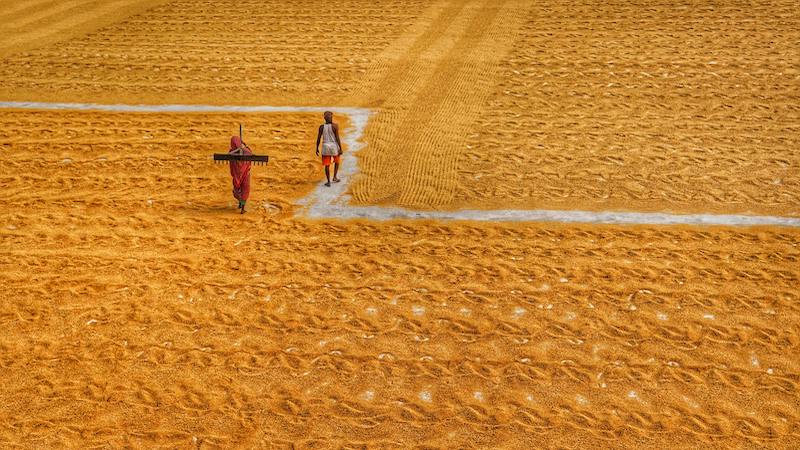By Shoba Suri
Rising challenges from climate change, environmental degradation, and biodiversity loss are exerting unprecedented strain on global food systems, undermining their ability to ensure food security for a projected 9.1 billion people by 2050.
According to the Sixth Assessment Report of the Intergovernmental Panel on Climate Change (IPCC), food, land, and water systems lie at the core of the climate crisis, where escalating extreme events, such as heatwaves, droughts, floods, and rising temperatures, are diminishing both crop yields and nutritional quality.
For instance, in India, heatwaves have reduced wheat yields by up to 15-25 percent, exacerbating food insecurity. These challenges, compounded by the rapid growth in global food demand, urbanisation, and agricultural expansion, are intensifying environmental pressures and inequalities in food accessibility, especially for smallholder farmers in vulnerable regions such as West Africa and India. This warrants an urgent inquiry into reimagining food production, distribution, and consumption through innovative approaches that also advance sustainability and strengthen systemic resilience.
The International Union for Conservation of Nature (IUCN) defines Nature-based Solutions (NbS) as “actions to protect, conserve, restore, sustainably use and manage natural or modified terrestrial, freshwater, coastal and marine ecosystems which address social, economic and environmental challenges effectively and adaptively, while simultaneously providing human well-being, ecosystem services, resilience and biodiversity benefits” (Figure 1).
NbS could contribute 30 percent of the cost-effective mitigation needed by 2030 or 2050 to keep global warming below the 2°C threshold, as agreed under the 2015 Paris Agreement.
Globally, rising average temperatures, shifting rainfall patterns, and intensifying extreme events are already undermining crop and livestock productivity, particularly in tropical and subtropical regions.
According to estimates, crop yields in West and East Africa are projected to decline by 2.9 percent by 2030 and up to 18 percent by 2050, underscoring the urgency for adaptive policies and resilient food system strategies.
Rising average temperatures are reducing soil moisture, heightening water demand, and intensifying water stress—factors that directly undermine farmer incomes and food security. NbS, such as agroforestry, conservation agriculture, and mangrove restoration, offer sustainable pathways to address these challenges by enhancing biodiversity, curbing pollution, and contributing to climate mitigation through carbon sequestration and emission reductions.
The importance of regenerative agriculture, a key NbS approach, is increasingly gaining recognition for its ability to revitalise ecosystems by emphasising biodiversity, soil health, and climate change mitigation.
In India, the Zero Budget Natural Farming (ZBNF) initiative has shown promising results, enhancing farmer incomes while strengthening soil health. The government supports this through programmes such as the Paramparagat Krishi Vikas Yojana (PKVY), which promotes organic farming and soil health with training initiatives and subsidies.
In China, integrated agricultural systems such as rice-fish-duck farming, which combine crops, aquaculture, and livestock, enhance food safety, productivity, and environmental health by utilising natural pest and weed control, nutrient recycling, and improved soil fertility. The role of NbS in conserving and restoring marine and coastal ecosystems is getting increasingly acknowledged.
In Bangladesh, mangrove restoration in the Sundarbans—the world’s largest contiguous mangrove forest—acts as a natural safeguard against flooding and storm surges for millions along the Bay of Bengal, while simultaneously supporting local livelihoods and fisheries. NbS, therefore, has the potential to transform food systems by restoring ecosystems, boosting productivity/safety, and promoting equity. Nonetheless, scaling necessitates urgent redressal of institutional and financial challenges.
Despite their promise, nature-based farming methods face several barriers to adoption. Many farmers have limited awareness of sustainable agricultural practices and their long-term benefits. They frequently rely on excessive use of pesticides and fertilisers without recognising their negative impacts on soil health and crop productivity.
Research indicates that strategies focused solely on productivity compromise the long-term sustainability of agroecosystems by overlooking overall ecosystem performance. In urban contexts, fragmented institutional frameworks and divided administrative responsibilities impede cross-sectoral collaboration, limiting the integration of NbS into national policies and local planning initiatives.
Successful implementation of NbS requires robust institutional frameworks, adequate financing, and supportive policies. Governments need to foster enabling environments by embedding NbS into national climate and food strategies, including the Nationally Determined Contributions under the Paris Agreement.
Financial incentives, such as carbon credits or payments for ecosystem services (PES), can ensure equitable compensation for farmers to adopt sustainable practices, including agroforestry, which improves carbon sequestration and reduces sediment and nutrient runoff.
For example, Costa Rica’s PES programme rewards farmers for preserving forests, enhancing both incomes and biodiversity. Aligning NbS with global frameworks, such as the United Nations Decade on Ecosystem Restoration, can scale and strengthen policy integration. It can also improve access to investment demands for meeting the 2070 (India) or 2030 (global) Net-Zero targets.
Echoing the quote, “The benefits of Nature-based Solutions for biodiversity and human well-being flow from healthy ecosystems,” NbS provides sustainable solutions by restoring ecosystems, supporting livelihoods, and ensuring food security. By embracing community-driven initiatives that utilise indigenous knowledge, and prioritising education for farmers—particularly women and indigenous communities —we can cultivate thriving ecosystems that underpin both nature and human well-being.
About the author: Shoba Suri is a Senior Fellow at the Health Initiative, Observer Research Foundation
Source: This article was published by Observer Research Foundation
